Danselle
On this page, you find all documents, package deals, and flashcards offered by seller danselle.
- 35
- 0
- 0
Community
- Followers
- Following
35 items
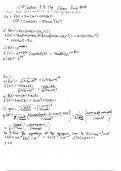
Chain Rule Notes for Calculus 1 (TAMU MATH151)
Notes written on the topic of Chain Rule as taught by Amy Austin in MATH 151 at TAMU. These notes contain the formula for the chain rule of derivatives as well as numerous examples using various functions including trigonometry and e values.
- Class notes
- • 2 pages •
Notes written on the topic of Chain Rule as taught by Amy Austin in MATH 151 at TAMU. These notes contain the formula for the chain rule of derivatives as well as numerous examples using various functions including trigonometry and e values.
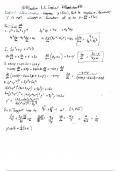
Implicit Differentiation Notes for Calculus 1 (TAMU MATH151)
Notes taken on the topic of implicit differentiation as taught by Amy Austin in MATH 151 at TAMU. These notes contain definitions of implicit differentiation and tangency as well as numerous examples with work for each. There are also equations provided for the derivatives of inverse trigonometry such as arcsin and arccos.
- Class notes
- • 3 pages •
Notes taken on the topic of implicit differentiation as taught by Amy Austin in MATH 151 at TAMU. These notes contain definitions of implicit differentiation and tangency as well as numerous examples with work for each. There are also equations provided for the derivatives of inverse trigonometry such as arcsin and arccos.
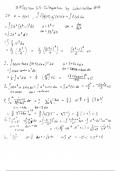
Integration by Substitution Notes for Calculus 1 (TAMU MATH151)
Notes taken on the topic of integration by substitution as taught by Amy Austin in MATH 151 at TAMU. These notes provide numerous examples and work for integration problems using the method of substitution to solve them.
- Class notes
- • 2 pages •
Notes taken on the topic of integration by substitution as taught by Amy Austin in MATH 151 at TAMU. These notes provide numerous examples and work for integration problems using the method of substitution to solve them.
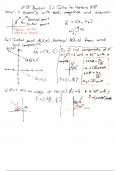
Introduction to Vector Notes for Calculus 1 (TAMU MATH151)
Notes taken on the topic of vectors as taught by Amy Austin in MATH 151 at TAMU. These notes contain definitions for vectors and their various manipulations such as sum, difference, and unit vectors. It also provides numerous examples and work for these definitions. Finally, it has a page of real-world applications of the concepts previously explained to physics and engineering.
- Class notes
- • 3 pages •
Notes taken on the topic of vectors as taught by Amy Austin in MATH 151 at TAMU. These notes contain definitions for vectors and their various manipulations such as sum, difference, and unit vectors. It also provides numerous examples and work for these definitions. Finally, it has a page of real-world applications of the concepts previously explained to physics and engineering.
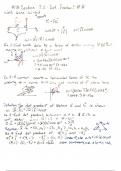
Dot Product Notes for Calculus 1 (TAMU MATH151)
Notes taken on the topic of dot products as taught by Amy Austin in MATH 151 at TAMU. These notes provide definitions of dot products, orthogonal complements, and vector and scalar projections, as well as numerous real-world applications of these terms using force and work (W = Fd).
- Class notes
- • 4 pages •
Notes taken on the topic of dot products as taught by Amy Austin in MATH 151 at TAMU. These notes provide definitions of dot products, orthogonal complements, and vector and scalar projections, as well as numerous real-world applications of these terms using force and work (W = Fd).
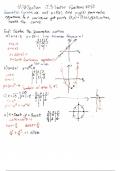
Vector Function Notes for MATH151
Notes taken on the topic of vector functions as taught by Amy Austin in MATH 151 at TAMU. These notes provide a brief definition of parametric curves and vector functions and then show numerous examples on how to use these expressions to describe lines, curves, and other mathematical expressions.
- Class notes
- • 3 pages •
Notes taken on the topic of vector functions as taught by Amy Austin in MATH 151 at TAMU. These notes provide a brief definition of parametric curves and vector functions and then show numerous examples on how to use these expressions to describe lines, curves, and other mathematical expressions.
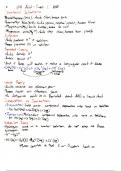
Acids and Bases Notes for Chemistry 1 (TAMU CHEM120)
Notes taken on the topic of acids and bases as taught by Dr. Williamson in CHEM 120 at TAMU. These notes provide an all-around in-depth explanation of acids and bases. They begin with definitions of Lewis acids and bases as well as Bronsted-Lowry acids and bases. The rules for all these acids and bases are then described, showing the separation between strong and weak acids and bases. The rules across the periodic table are shown, describing the electronegative trend. The relation of these acids...
- Class notes
- • 7 pages •
Notes taken on the topic of acids and bases as taught by Dr. Williamson in CHEM 120 at TAMU. These notes provide an all-around in-depth explanation of acids and bases. They begin with definitions of Lewis acids and bases as well as Bronsted-Lowry acids and bases. The rules for all these acids and bases are then described, showing the separation between strong and weak acids and bases. The rules across the periodic table are shown, describing the electronegative trend. The relation of these acids...
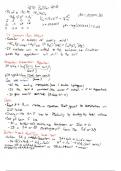
Buffer Notes for Chemistry 1 (TAMU CHEM120)
Notes taken on the topic of buffers as taught by Dr. Williamson in CHEM 120 at TAMU. These notes show some examples of RICE tables used for buffers to calculate Ka, Kb, pH, and/or pOH. They then describe and show how to use the Henderson Hasselbalch Equation to calculate the pH or pOH of a buffer solution which is an imperative skill in chemistry. Finally, they describe how else these buffers are sued and other applications.
- Class notes
- • 1 pages •
Notes taken on the topic of buffers as taught by Dr. Williamson in CHEM 120 at TAMU. These notes show some examples of RICE tables used for buffers to calculate Ka, Kb, pH, and/or pOH. They then describe and show how to use the Henderson Hasselbalch Equation to calculate the pH or pOH of a buffer solution which is an imperative skill in chemistry. Finally, they describe how else these buffers are sued and other applications.
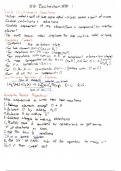
Electrochemistry Notes for Chemistry 1 (TAMU CHEM120)
Notes taken on the topic of Electrochemistry as taught by Dr. Williamson in CHEM 120 at TAMU. These Notes describe single displacement reactions and go well into depth on oxidation numbers and how to calculate them. It then furthers this idea by providing information on how to balance REDOX Equations stoichiometrically. The notes then move on to describing voltaic cells and the electrochemical cells and electrodes within. These cells are used to calculate cell potential using REDOX reaction rule...
- Class notes
- • 7 pages •
Notes taken on the topic of Electrochemistry as taught by Dr. Williamson in CHEM 120 at TAMU. These Notes describe single displacement reactions and go well into depth on oxidation numbers and how to calculate them. It then furthers this idea by providing information on how to balance REDOX Equations stoichiometrically. The notes then move on to describing voltaic cells and the electrochemical cells and electrodes within. These cells are used to calculate cell potential using REDOX reaction rule...
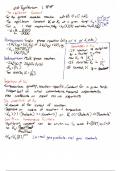
Equilibrium Notes for Chemistry 1 (TAMU CHEM120)
Notes taken on the topic of equilibrium as taught by Dr. Williamson in CHEM 120 at TAMU. These notes describe the equilibrium constant K and explores its magnitude, properties, variations, and formulas. It provides multiple equations such as gas laws and converting Kp to Kc. It then briefly shows how to use RICE tables and how Q (reaction quotient) relates to the K expression in a chemical reaction. Next, it explores this relationship again, but through Le Chatlier's Principle which describes th...
- Class notes
- • 3 pages •
Notes taken on the topic of equilibrium as taught by Dr. Williamson in CHEM 120 at TAMU. These notes describe the equilibrium constant K and explores its magnitude, properties, variations, and formulas. It provides multiple equations such as gas laws and converting Kp to Kc. It then briefly shows how to use RICE tables and how Q (reaction quotient) relates to the K expression in a chemical reaction. Next, it explores this relationship again, but through Le Chatlier's Principle which describes th...
